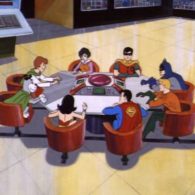During the Agorae, there are many candidatures for elected offices, for which you can vote. It is expected that the delegates of the Agora have been properly instructed about who they can vote for, and why these functions are important to AEGEE. Nevertheless, two out of every five participants of the Agora have never been to one before, and AEGEE is a large and multifaceted organisation that can be hard to dissect. That is why we have a short list of all the candidatures for all the functions that could theoretically be voted for at the Agora. So, here is something you can share with everyone who would like to refresh his or her memory of what they are actually voting for.
 Chairperson and Vice-Chairperson of the Agora and EPM
Chairperson and Vice-Chairperson of the Agora and EPM
The Chairperson and Vice-Chairperson are two vital people at an Agora and EPM in order to streamline the event. Telling everyone when everything is happening, how long everyone can talk, when everyone can ask questions and to whom, and moreover, they are crucial to prevent a cacophony or even a complete derailment of the meeting. Without a (vice-)chairperson, these meetings might very well take ten times longer, while accomplishing the exact same thing.
 Member of the Audit Commission
Member of the Audit Commission
The members of the Audit commission help by checking the bookkeeping of AEGEE-Europe, and locals of AEGEE, and that of Working Groups, and even of events that are hosted by AEGEE-Europe. To top that, they also need to approve the financial reports of all these aforementioned institutions, except for locals. So, if you ever had to fill in a financial report, it was, in part, for these guys.
If you think these financial detectives are finally done after checking and approving all of this, you’d be wrong. Afterwards, they need to present all of their findings at each Agora, for which there isn’t, as of yet, any reimbursements for their travel costs.
 Member of the Mediation Commission
Member of the Mediation Commission
The Mediation Commission, formerly the Members Commission, is basically like your old primary school councellor on steroids. They are mediators, as the name suggests, between any people or bodies of AEGEE, should this be necessary, and, when they mediate, they can also give requested or unrequested advise.
However, what many members may not realise, is that they are also part of the juridical branch of AEGEE; chiefly operating as its judges. Instead of mediating a dispute, they are also allowed to settle it. In extreme cases this can result to the suggestion of disciplinary sanctions as draconic as the expulsion of an entire local from the network. In short, just like for any other function, it is pretty important to elect the right people for this job.
 Member of the Network Commission
Member of the Network Commission
At first glance, the Network Commission might seem like that collection of big umbrellas under the even bigger umbrella of the CD; a sort of ‘super board’ of your local and its neighbouring ones. The NetCom actually has mostly to do with communication, furthering cooperation between, and giving support to locals.
The Network Commission was established at Autumn Agora Athina approximately twenty years ago, because by then, AEGEE had become so large that it had become hard to organise it as efficiently as in the decade before. Imagine that, if AEGEE did not decide to create the NetCom, nowadays all of its almost two hundred locals had to be managed and supported by a single person; the Network Director of AEGEE-Europe.
The Network Commission takes a vital role, as each of its members supports only a handful of locals, and thus becomes an important link between the locals themselves and AEGEE(-Europe) as a whole. The decision to break the network down into smaller, more manageable bits in 1996, allowed it to continue efficiently. It, furthermore, allowed the CD to be reduced that same year from twelve to only nine people. For an ever expanding network, it is important for the NetCom to remain functioning.
 Member of the Summer University Coordination Team
Member of the Summer University Coordination Team
The Summer University Coordination Team, or SUCT in short, is pretty much exactly what you would picture, when hearing its name: it is a team of four people who coordinate the Summer Universities. There are a lot of intricate details about the responsibilities of the SUCT, but to keep things simple, one can say that the SUCT is a necessary hub that can aid, advise, encourage, and oversee all teams that are going to organise Summer Universities.
The importance of the SUCT also comes from other factors, such as the fact that the Summer Universities are, currently, one of the most, if not, the most significant recruitment events of AEGEE. Another factor, that ties into this, is the programme of the SUs. Summer Universities can fall victim of becoming ‘cheap holidays’, and students could only join AEGEE as a ‘necessary evil’ to go on this ‘cheap holiday’, without the intention of trying anything else in AEGEE. Members of the SUCT, therefore, always have to remain vigilant that the programmes of the Summer Universities include life changing experiences that contribute to the vision of AEGEE, without being boring or losing popularity.
 Secretary General of AEGEE-Europe
Secretary General of AEGEE-Europe
The role Secretary General, however, might not be what you thought at first glance; at least, if you imagined it as the highest executive office of the Union of Europtimistic AEGEE Locals. The tasks of the Secretary General can most easily be explained by comparing it to the tasks of your local’s secretary; taking minutes, keeping the archive, be present at board meetings, etcetera. Except for that fact, this secretary is also the secretary of the board that represents the entire association. Hence the suffix ‘general’, in order to clarify that it is the secretary with the highest function.
Written by Willem Laurentzen, AEGEE-Nijmegen

